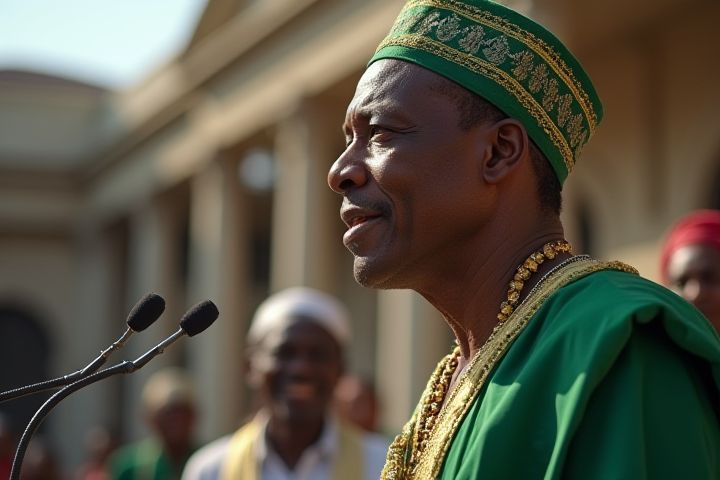
Nigeria operates as a federal republic with a presidential system, featuring multi-party elections. The nation's democracy has evolved since gaining independence in 1960, with significant reforms aimed at enhancing political participation and governance. Your involvement in the electoral process, through voting and advocacy, strengthens democratic principles and accountability. However, challenges persist, including issues such as electoral fraud, political violence, and limited access to reliable information. Despite these obstacles, Nigeria continues to strive towards a more robust democratic framework, reflecting the resilience of its citizens.
Presidential system
Nigeria operates a presidential system of democracy, characterized by a separation of powers among the executive, legislative, and judicial branches. The President, elected for a four-year term, serves as both the head of state and government, wielding significant authority over national policies and administration. Elections are conducted at various levels, with an independent electoral commission overseeing the process to ensure transparency and credibility. Political parties play a crucial role in this democratic framework, influencing governance and representing diverse interests across Nigeria's multifaceted society.
Multi-party system
Nigeria operates within a multi-party system, allowing a diverse range of political parties to participate in the democratic process. The major political parties, including the All Progressives Congress (APC) and the People's Democratic Party (PDP), play significant roles in shaping national governance and policies. Elections are held periodically, providing citizens with the opportunity to vote for their preferred candidates at various levels of government. This multi-party framework aims to promote political pluralism, representation, and active civic engagement among Nigerian citizens.
Electoral process
Nigeria operates as a federal republic with a vibrant yet complex democratic system. The electoral process involves regular elections, including presidential, gubernatorial, and legislative contests, where the Independent National Electoral Commission (INEC) oversees the administration and integrity of the polls. Voter registration is critical, as it ensures eligible citizens can participate in shaping their government; however, challenges such as voter intimidation and electoral fraud persist. Your engagement in the electoral process, from registration to voting, is vital to fostering a more robust democracy in Nigeria.
Independent judiciary
Nigeria operates under a federal democratic system characterized by a separation of powers among the executive, legislative, and judiciary branches. The independence of the judiciary is constitutionally mandated, ensuring that judges can make impartial decisions free from external influence, which is crucial for upholding the rule of law. Various legal reforms and judicial appointments aim to enhance the judiciary's integrity and effectiveness, addressing challenges like corruption and inefficiency. For citizens, a robust independent judiciary serves as a safeguard for fundamental rights and a mechanism for justice, thereby reinforcing democratic principles in Nigeria.
Legislative branches
Nigeria operates as a federal republic with a democratic governance structure, characterized by a bicameral legislature comprised of the Senate and the House of Representatives. The National Assembly, representing the legislative branch, plays a crucial role in crafting and enacting laws, overseeing executive actions, and approving budgets. Senators serve four-year terms, representing the country's 36 states and the Federal Capital Territory, while House members serve two-year terms, directly elected from constituencies. This legislative framework ensures representation across diverse regions, contributing to Nigeria's democratic processes and enhancing citizen participation in governance.
Separation of powers
Nigeria operates under a federal democratic system that emphasizes the separation of powers among three branches: the executive, legislative, and judicial. This framework is designed to prevent the concentration of power and ensure accountability within the government. The President, as the head of state, is separate from the National Assembly, which comprises the Senate and the House of Representatives, allowing for independent legislative functions. The judiciary, including the Supreme Court, serves to interpret laws and safeguard citizens' rights, reinforcing the fundamental principles of democracy in Nigeria.
Term limits
Nigeria's democracy is marked by its constitutional provision for term limits, which stipulates that elected officials, including the President, can serve a maximum of two terms of four years each. This framework aims to promote political stability and prevent the entrenchment of power among leaders. Despite these regulations, debates around term limits have surfaced, particularly regarding attempts to extend tenure or amend the constitution for personal gain. As a citizen, your engagement in political discourse surrounding term limits is crucial for upholding democratic principles in Nigeria.
Regular elections
Nigeria operates as a federal republic, emphasizing the importance of regular elections as a cornerstone of its democratic framework. The Independent National Electoral Commission (INEC) is responsible for overseeing the electoral process, ensuring free and fair elections at both state and national levels. Every four years, citizens exercise their right to vote, influencing the selection of leaders from the presidential to the local government tier. Recent electoral reforms aim to enhance transparency and build public trust in the electoral system, reflecting Nigeria's commitment to strengthening its democracy.
Civil liberties
Nigeria operates as a federal republic characterized by a multi-party system, emphasizing the importance of civil liberties such as freedom of speech, assembly, and religion. Despite constitutional provisions safeguarding these rights, issues like political repression, human rights abuses, and limitations on press freedom persist, impacting the overall democratic landscape. Civil society organizations actively work to promote and protect these liberties, advocating for greater accountability and transparency in governance. Your engagement in supporting these efforts can contribute to strengthening democracy and enhancing civil rights in Nigeria.
Anti-corruption efforts
Nigeria operates as a federal republic with a democratic system, yet it grapples with significant anti-corruption challenges. The government has initiated various reforms and established agencies like the Economic and Financial Crimes Commission (EFCC) to combat corruption in public office. These efforts aim to enhance transparency, improve governance, and restore public trust in institutions. Your awareness of the ongoing political dynamics and civil society participation is essential in understanding the effectiveness of these anti-corruption initiatives.
